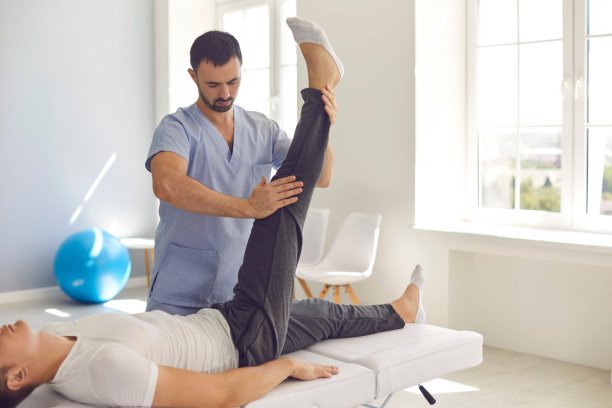Knee pain is such a common complaint amongst several Indians that many of them don’t know when to seek advice or consult a doctor. While minor aches can be healed and improved with sufficient self-care and rest, certain warning signs must not be ignored, and you should seek a medical opinion immediately. Early evaluation results in effective relief and prevents further issues from arising.
In this blog, we will explore key warning signs that signal you should seek medical advice immediately, as well as the specialist you should consult.
Warning Signs You Should Not Ignore
It is critical that you listen to the signs your body gives you. You must consult a doctor promptly if you experience any of the following:
1. Instability or the inability to bear weight
If your knees feel as if they might give way under your weight or are unable to support your weight, it may be a red flag. A buckling or wobbly knee indicates ligament injuries, and it is best to undergo an evaluation for this condition. It may also influence other parts of your body, particularly your spine. Read more about how knee instability can affect your lower back and overall posture.
2. Significant deformity or swelling
You may notice that your knee looks deformed, misaligned, or swollen. This is often a sign of a serious injury, such as a dislocation or a fracture. If one knee appears to be bigger than the other, you must consult a doctor to look at it.
3. ‘Locked’ knee or a limited range of motion
If you are unable to straighten or bend your knee fully, it can be a sign of concern. If your knee becomes “locked” or stuck in one position and does not move, that requires a trip to the doctor. It could indicate an internal problem or a torn meniscus.
4. Persistent or severe knee pain
If you experience intense pain, especially after an injury, and if a “pop” sound accompanies it, you must get your knee examined by a doctor. Any pain that persists despite rest or lasts more than a few days should be evaluated by a medical professional. Persistent pain after an injury could also increase your risk of developing osteoarthritis over time. Learn more about the long-term consequences of knee injuries.
5. Redness or heat
Swelling, redness, or warmth in your knee, along with feeling unwell or a fever, indicates an infection in the joint. This requires immediate medical attention.

In general, any issue in your knee that significantly hinders your daily activities, including regular walking, climbing stairs, or disturbed sleep due to knee pain, is worth consulting a doctor about. It is best to have a medical professional assess these symptoms early rather than ignoring the pain and risking potential complications.
Which Specialist Should You See?
The healthcare system is often confusing. Which specialist should you consult? The answer usually depends on your symptoms and situation. However, we have put specific guidelines together that may help you make a decision:
1. Orthopaedic Specialist
See an Orthopaedic Specialist for severe or persistent problems. An orthopaedic surgeon specialises in treating bone and joint disorders. You don’t always need to go directly to a surgeon, but if your knee pain is severe, not improving, or your General Practitioner recommends it, seeing an orthopaedic doctor is a good idea.
For instance, injuries like ligament tears, significant cartilage damage, fractures, or advanced arthritis are best managed by an orthopaedic specialist. They can provide expert diagnosis, often confirmed with imaging like MRI, and offer treatments ranging from injections to surgery if required.
In practical terms, signs that you should see an orthopaedic doctor include pain lasting more than two weeks without relief, significant swelling, difficulty bearing weight, or mechanical issues like knee locking. You can also choose to see a specialist first, especially for acute sports injuries.
2. Physiotherapist
Physiotherapists (physical therapists) are experts in musculoskeletal care and rehabilitation. In many cases of knee pain, a physiotherapist can be the first professional you consult, particularly if the pain comes on gradually or you suspect it is a soft tissue or overuse issue.
Physiotherapists are trained to evaluate knee problems and can determine if your injury is something they can treat or if you need a doctor’s attention. A physiotherapist will work to relieve pain and improve strength and flexibility through guided exercises and modalities.
Conditions such as tendon strains, runner’s knee, mild osteoarthritis, or recovery after injury respond very well to physiotherapy. However, a good physiotherapist will refer you to a doctor if they find red flags. For example, if they suspect a significant ligament tear or fracture that hasn’t been assessed.
In an ideal scenario, orthopaedic specialists and physiotherapists work hand-in-hand: you might see a doctor to rule out serious issues and then continue with physiotherapy for rehabilitation.
In summary, for mild or short-lived knee pain, your General Practitioner or a physiotherapist is a great starting point. They will guide initial treatment and steer you to a specialist if needed. For severe, unusual, or long-lasting pain or injuries from trauma, an orthopaedic specialist’s evaluation is likely the best course.
Remember, you know your body best. When in doubt, there is no harm in starting with one provider. If the problem is beyond their scope, they will direct you to the appropriate specialist.
Challenges in Seeking Medical Care in India
Knee pain is a significant health concern in India, but many people delay seeking medical attention for it. A study revealed that 47% of Indians over age 45 report chronic joint pain, yet most do not seek timely medical attention. It is common for individuals first to try home remedies, over-the-counter painkillers, or traditional treatments, hoping the pain will go away on its own.
Culturally, approaches such as massage oils, Ayurveda, or simply “resting it out” are often attempted before resorting to modern medical care. Unfortunately, this delay can sometimes exacerbate the underlying issue. Minor problems might become more serious over time if not adequately treated.
Several factors contribute to this hesitation. Cost and accessibility play a significant role. Seeing specialists or getting an MRI can be expensive, and in rural areas, orthopaedic doctors or physiotherapists may be hard to reach. There is also a lack of awareness in some cases. People may not realise that early intervention can prevent more significant problems. Misconceptions like believing knee pain is always a regular part of ageing or that one should only see a doctor if they “can’t walk at all” lead to many enduring pain longer than they should.
Traditional beliefs can also delay diagnosis. While home remedies and conventional medicine may provide temporary relief, they can also mask symptoms and delay proper diagnosis and treatment. The result is that by the time patients do see a doctor, the condition might have progressed, making treatment more complex.
What Can Be Done?
If you are in India and experiencing knee pain, try to seek advice early. Start with a local doctor, or consider a teleconsultation if specialists are far away, especially when the pain is persistent or significantly affecting your daily life.
Government and private hospitals often have orthopaedic departments and physiotherapy units. While there might be queues or wait times, getting an expert opinion is worth it. If cost is a concern, discuss it openly with your doctor. They might suggest step-wise treatments that are affordable.
Remember, addressing knee pain early can save you from more significant expenses down the line, such as surgeries, by managing the issue in its earlier stages. And while home remedies, such as heat ointments or wraps, can provide temporary comfort, use them in conjunction with medical advice, not as a total replacement. Thanks to advances in early diagnosis of knee osteoarthritis, it is now possible to detect joint issues well before they become visible in X-rays.
The key is balance. Respect the traditional methods that soothe you, but also embrace modern medicine for a proper diagnosis and long-term solution.
References
- Knee pain - Symptoms and causes - Mayo Clinic, https://www.mayoclinic.org/diseases-conditions/knee-pain/symptoms-causes/syc-20350849
- Torn Meniscus - Frequently Asked Questions (FAQs) | Cedars-Sinai, https://www.cedars-sinai.org/blog/meniscus-tears-faq.html
- When to See a Doctor for Knee Pain, https://www.hss.edu/health-library/move-better/when-to-see-doctor-for-knee-pain
- Orthopaedic Knee Doctors: When to See a Specialist | Orthopaedic Associates of Maine, https://www.orthoassociates.com/blog/orthopedic-knee-doctors-when-to-see-a-specialist-vs.a-general-practitioner
- When to See a Physical Therapist for Knee Pain, https://www.hss.edu/health-library/move-better/physical-therapist-for-knee-pain










